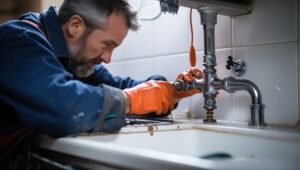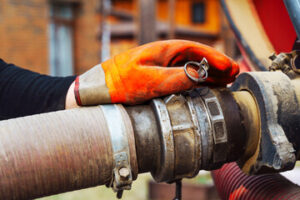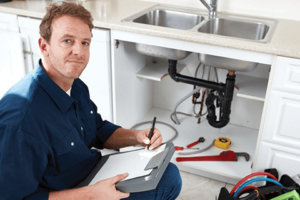Plumbers Bradenton install, repair, and maintain gas and water pipes and sanitation units like sinks, toilets, and showers. They also work with drainage systems and waste disposal units.
Plumbing is a skilled trade that requires specialized education and training. It involves working with a wide range of materials and complex machinery.

Plumbing systems are the pipes and fixtures that provide water, hot water, and sewage in residential, commercial, and industrial buildings. Plumbers install, inspect, and repair these systems to ensure they function properly and safely. They also ensure that the fixtures and pipes meet building codes and regulations. Some plumbers specialize in specific areas of the plumbing system. For example, some specialize in gas fittings, while others focus on toilets and sinks. Plumbers often need to work with heavy tools that require extensive manual dexterity. They also need to be able to climb ladders and work in tight spaces.
In addition to installing new plumbing fixtures, plumbers repair and replace existing ones. This includes replacing faucets, toilets, bathtubs, showers, and more. They can also perform routine maintenance on water heaters to keep them running efficiently.
Plumbers also inspect and test sewage systems for leaks, clogs, and other problems. They may use video cameras to diagnose issues and determine the best action. In some cases, they may need to remove and replace entire sections of sewage pipes. Plumbers specializing in sanitary plumbing systems also clean and disinfect sewer pipes and fixtures to prevent the spread of disease.
Many plumbers are self-employed contractors. They may also join a plumbing company that offers regular and emergency services. These companies typically have more experience and a wider range of services than independent plumbers. They may also provide warranties on their work.
Another important distinction between commercial and residential plumbers is their level of customer service. Residential plumbers spend most of their time working in a client’s home and must be able to explain complicated plumbing issues clearly. On the other hand, commercial plumbers deal with much larger buildings and may interact less with customers.
Plumbers need to be knowledgeable about the latest technologies in their field. They should be able to read blueprints and understand the requirements of local building codes. They should also be able to identify potential problems and provide solutions. They should also be able to communicate with clients effectively to assess their needs and provide advice.
Many people only realize how reliant they are on their plumbing systems once something goes wrong. When that happens, they need a professional plumber to fix the problem quickly and efficiently. Plumbers can repair leaky pipes, clogged sinks, toilets and bathtubs, garbage disposals, and more. They also have the skills to install new fixtures, such as showers and faucets.
A good plumber will have excellent customer service skills to answer questions and explain the problem in detail. They should also be able to work well under pressure and have the stamina to perform physical labor. Some plumbers specialize in specific areas, such as gas or water repairs. Others may focus on residential or commercial properties.
Plumbing technicians must be able to work with various tools and materials. They may have to cut through walls and floors to reach the pipes, which requires strong manual dexterity. They must be able to measure accurately and read blueprints. Plumbers must also be familiar with the building codes and regulations of each state or municipality.
Plumbers usually work alone or with other construction tradespeople, but they can also be self-employed and operate their own plumbing business. They can also join a union that negotiates wages and benefits for its members.
One of the most important services that plumbers provide is sewer line repair. Backed-up sewage can cause health problems, such as cholera, typhoid, and hepatitis. A backed-up sewer can damage your home’s appliances, including the dishwasher and washing machine. If you suspect a problem with your sewer lines, contact a plumber immediately.
While most people think of a plumber only when they have a problem, getting regular inspections of your plumbing system is a good idea. This will help identify issues before they become major problems, saving you time and money in the long run. Plumbers can also help you prevent sewage backups by regularly inspecting and cleaning your drains. They can also recommend energy-efficient solutions for your home or office. Contact a local plumbing company for more information.
One of the most important jobs that plumbers do is to perform regular maintenance and preemptive services. This includes everything from fixing leaky faucets to preventing clogs. They also provide drain cleaning services, which are a great way to get rid of any built-up debris that can cause serious problems later on down the line. A regular plumbing maintenance plan can save homeowners money and keep their pipes in better shape, so they last longer.
Another type of maintenance service that plumbers offer is septic system repair and installation. These experts can work with residential and commercial spaces and handle anything from repairing a toilet to installing an entire septic system. They can also install and repair water tanks, bathroom fixtures, and showers. These professionals often work with other construction teams to ensure the plumbing is integrated seamlessly into the overall building project.
Commercial plumbers are responsible for the plumbing in large office buildings, hospitals, and other public spaces. These systems are more complex than residential ones, requiring extensive training to understand how each component works together. They must also know how to handle hazardous materials and work in confined spaces.
Plumbers working on new construction projects are expected to understand engineering and architectural design. They must be able to read blueprints and plans to lay out piping accurately. They may also be responsible for obtaining the necessary permits and inspections. These plumbers are usually paid by the hour and may need to work overtime in the event of a plumbing emergency.
Residential plumbers are concerned with the plumbing in homes and apartments. They are responsible for installing and repairing sinks, toilets, bathtubs, and showers. They can also handle more complicated issues, like clogged drains and sewer lines. Residential plumbers are often required to travel between different properties and may need to do some digging to locate buried pipes. They often need to communicate with residents to understand their concerns and explain the issue clearly.
Plumbing systems are integral to people’s daily lives. They ensure the availability of clean, safe water for drinking and washing. They also protect people from water-borne diseases by collecting and draining wastewater efficiently. Plumbers are also responsible for installing and maintaining the piping systems of buildings of all types, including homes, schools, hospitals, and factories. Because of this, plumbers need to be knowledgeable about building codes and blueprints.
Plumbing jobs can be dangerous, but they are also very rewarding. The career is well-suited for people who enjoy working with their hands and solving problems. Plumbers often work with heavy equipment and tools, so they must be physically fit. The job is also challenging because it requires critical thinking and the ability to weigh multiple options when resolving a problem. The job is also recession-proof because people will always need their services, even when the economy is bad.
Plumbers must be able to work as part of a team. They often work with other tradespeople, such as electricians, carpenters, and contractors. They must be able to communicate with the other team members and understand their responsibilities. They must also be able to make decisions and follow directions quickly.
Another aspect of the job that requires good communication is customer interaction. Plumbers must be able to explain complex plumbing issues in layperson’s terms so that customers can understand them. They also need to be able to answer questions about the cost of materials and labor.
As a result, plumbers must be able to negotiate prices and contracts with clients. They must also be able to read and interpret blueprints and schematics. In addition, they must be able to make accurate measurements.
A high school diploma or equivalent is usually required for plumbers to begin their careers. Many plumbers receive on-the-job training, but technical schools with courses in pipe system design, tool use, and safety are also beneficial. After completing an apprenticeship program, plumbers are considered journey workers and may be eligible for master status with additional courses and experience.






